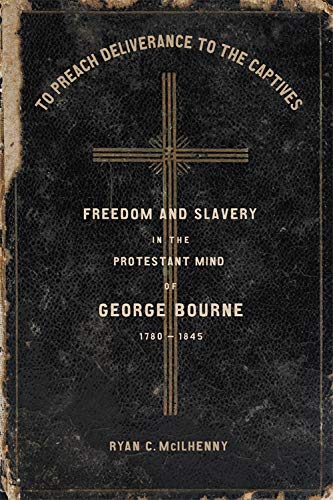
Ryan C. McIlhenny
Reviewed by: Alan D. Strange
To Preach Deliverance to the Captives: Freedom and Slavery in the Protestant Mind of George Bourne, 1780–1845 (Antislavery, Abolition, and the Atlantic World), by Ryan C. McIlhenny. LSU Press, 2020. Hardcover, 420 pages, $45.00. Reviewed by OP minister and professor Alan D. Strange.
Professor McIlhenny, in this reworking of his doctoral dissertation, introduces the reader to Irish-born George Bourne, an important figure in the rise of American abolitionism. One of the seminal figures that Bourne influenced was William Lloyd Garrison, editor of the well-known antislavery newspaper The Liberator, which began publication in 1831. Garrison and others testified to the power and rhetoric of the transplanted Bourne’s arguments in persuading them of the utter horror and sinfulness of American chattel slavery.
Bourne became, particularly in moving to the slave state of Virginia, an outspoken advocate of immediate abolition, arguing that slave-owning should disqualify one from membership in the Presbyterian church and that those who refused to manumit their slaves should be excommunicated. While the Covenanters—or Reformed Presbyterians—had always opposed slaveholding and would censure any members who engaged in it, the Presbyterian Church in the USA (PCUSA) would not do such, and Bourne’s position was regarded as radical and dangerous. The significant majority of the PCUSA, especially the Old School after the split in 1837, opposed abolitionism because they saw it, unlike gradual emancipation, as fanaticism that opposed slavery at all costs, imperiling the unity of the church and the nation.
There was a judicial back and forth from 1815–1818 over Bourne’s views, and at the end of it all, Bourne was defrocked and forced to leave his church. Interestingly, in that same 1818 General Assembly, a remarkable statement was adopted by the PCUSA condemning slavery in no uncertain terms and calling for the emancipation of slaves stateside and worldwide. Subsequently, Bourne served a congregational church in Canada, and then upon his return to New York, several (Dutch) Reformed congregations in the New York classis. Many abolitionists rejected the Bible since it did not seem on its face to condemn slavery; Bourne, and some others, however, showed that the Bible did condemn the kind of slavery that was in America and argued that those who defended American slavery biblically twisted and abused the text of Scripture in order to do so.
A feature of Bourne’s life, and of this book, that may surprise those unfamiliar with American and broader English history, is Bourne’s virulent “anti-popery,” second in McIlhenny’s narrative only to Bourne’s disdain for slavery. They are, in fact, tied together. Bourne’s anti-Catholicism is not mere religious bigotry as one would discover today in the anti-Catholicism of the media and others in our secularized culture. Bourne’s animus against Rome had deep Protestant roots, especially among those who championed republican government, as did Bourne, and eschewed monarchy.
In short, Bourne disliked any sort of absolutism, whether in state (as in the England from which he and much of America came) or in church, manifested chiefly in the hierarchical episcopacy of the Roman church, particularly in the claims of the papacy. To Bourne, as McIlhenny sets forth in chapters 4 and 6, slavery and popery must be defeated so that maximum freedom may reign in every sphere. This is how the Protestant mind of George Bourne functioned. Perhaps this is the lesson to learn from Bourne: properly cherish biblical freedom and seek to develop it over forms of control and dominance.
November 16, 2025
November 09, 2025
November 02, 2025
October 26, 2025
October 19, 2025
October 05, 2025
Raising Sexually Faithful Kids and
Parenting Boys and Girls in a Gender-Confused World
September 28, 2025
© 2025 The Orthodox Presbyterian Church